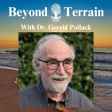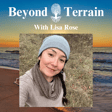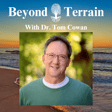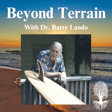Introduction to Beyond Terrain Podcast
00:00:00
Speaker
Welcome everyone to another episode of the Beyond Terrain Podcast. I am your host, Liev Dalton. If you're new around here, consider subscribing or following the show. And if you like what we do, consider liking, commenting your thoughts on the episode, leaving us a rating or a review. Sharing is always the best way to support us.
Launch of Beyond Terrain Community
00:00:16
Speaker
I'm thrilled to finally announce that the Beyond Terrain community is live. It has been a long time coming. And this is more than just a platform. You know, this is a representative of a lifestyle shift. Beyond Terrain is a movement It's part of a bigger paradigm shift, the terrain paradigm. And this is a place to unlearn, connect with others, learn from others, and reconnect in a meaningful way.
Membership Benefits and Opportunities
00:00:39
Speaker
Rooted in nature, guided by logic, and driven by truth. It is free to join the community, so there's no reason to not sign up. You'll gain access to introductory classrooms on the causes of disease, as well as masterclasses and the fundamentals of the terrain paradigm. If you want to go deeper, becoming a full member gives you access to many more things, including deep dives. First, we have dove into parasites and covered absolutely everything about them. Methods used in science, their ecologies, human experiments, etc. Future deep dives will include cell biology, genetics, mold, bacteria, etc. We have absolutely no limit. We also discuss things like movement, lifestyle, reflections, we do live Q&As and discussion calls. of course, as a member, you'll gain access to future discussions, live calls, masterclasses, workshops, etc. You will also have the opportunity to win terrain-approved prizes. This could be organic, natural clothing, it could be booked
00:01:34
Speaker
Our founding member offer only contains 100 spots and these will go very quick. You'll be able to lock in that low price, gain access to a complimentary onboarding call, and what you'll really gain access to is shaping the community. This is a growing, living, breathing community in which you'll be able to support me and my work while getting lots of value in return. So go check it out.
00:01:54
Speaker
But without further ado, let's get into today's
Exploring DNA: Dr. Tomczyk's Perspective
00:01:57
Speaker
episode. Dr. Tomczyk, thank you for coming on the podcast once again. ah Really looking forward to our conversation today. Hi, Liev, thank you for contacting me again. i think we promised write some some sort of continuation to our PCR discussion.
00:02:14
Speaker
So, yeah, thank you for having me. Of course. Yeah. So if you guys haven't checked that one out already, this is our second podcast together. Make sure to go listen to that first one. It was all about PCR, dismantling that.
00:02:26
Speaker
ah We'll probably touch on PCR a little bit today. It's really a central topic when it comes to our main topic of discussion today, which is the genome, DNA, genomics.
00:02:37
Speaker
What are we... What are we even gonna be talking about today? There's lots of questions going on. We're gonna try to address some of those questions.
Challenging Established Scientific Beliefs
00:02:45
Speaker
um And yeah, this is kind of a difficult conversation um because I'm sure Dr. Tomczyk will agree that it's a little bit hard to discern what exactly is going on if you know DNA doesn't exist as we know it. you know So trying to provide some sort of positive statement you know of what's going on ah is the more difficult thing to do, right? So we'll try to stay within what can we objectively observe and confirm um and then question the rest.
00:03:19
Speaker
reality know, the the reality is um i know Those folks like Dr. Cowan and Alex Zeck, they always discuss these things that you don't necessarily need to provide a positive claim when you falsify ah claim.
00:03:34
Speaker
ah That's certainly the case, but it's nice to maybe speculate a little bit and try to discuss what exactly is going on. Renee, is there anything that you want to open with here, leave the listener with before we kind of dive too deep in here into this topic?
Education and Open-Mindedness in Science
00:03:50
Speaker
Oh boy. I mean... Of course, I've been accused of somebody that has no clue what she's talking about right because it's completely the opposite compared to what I was told in school so.
00:04:04
Speaker
Yeah, um it's hard for people that are just jumping in and ah hearing it for the first time, it's hard for them to completely grasp it or at least to say, okay, maybe she knows what she's talking about, but it's completely the opposite of what I was told in high school or whatever, if somebody did some college classes of molecular biology and stuff.
00:04:27
Speaker
But what I realized five years ago, having an open mind is the most important thing going forward.
Research Funding and Influence on Science
00:04:35
Speaker
And it's only served me well, because if I closed it back in the day, um i wouldn't be where I'm at.
00:04:44
Speaker
Meaning I'm still working in at the same job, working with DNA that doesn't exist. So, you know, still chasing down in minus 80 freezers, my DNA samples and really wondering why i'm still there but i know that i have to be there because there are so many changes going on right now so just a brief thing that i want to throw out for people that are not in academia that are not around ah professors that are not in these high important places whatever um the amount of going on is a lot because um research funding is being cut
00:05:25
Speaker
and i'm happy about it because once i understand what research is how we are going down completely the wrong path like completely the opposite completely upside down so i'm like okay uh once understood that things need to change i'm like how are they going to change oh they're going to change the hard way all these different professors will stop getting funded.
00:05:51
Speaker
First, it was based on, oh, if your research is on ah diversity, equity and inclusion with that whole thing, then you will stop getting funding. And now it's going further and further into things where even my supervisor, she has no clue what's going on.
Dogma vs. Open Inquiry in Science
00:06:11
Speaker
She just believes that everybody that's in charge of cutting the funding is completely incompetent so this is the point of view of somebody that has no truly no clue what's going on in the world that truly has no clue that ever no clue that everything is upside down for her everybody that's doing what they're doing are just incompetent so but i think i need to be the witness of the whole madness and in the meantime i'm talking to a few people a few of my co-workers and
00:06:47
Speaker
um explaining things to them why things are the way they are so they are not completely lost because they are less brainwashed they are more fresh they are younger they just finished maybe uh grad school or something so you can still influence them in a good way in a positive way like explain to them look try to find something um that has Tarricone, that has future let's say, but my supervisor who's way over 60 how am I going to change her mind that's just not gonna. Sofia Tarricone, Work, but at least maybe I can drop some seeds, you know here and there so so that's. Sofia Tarricone, That just one thing that I wanted to throw out there, because I mean people that are not in sciences, they don't understand why some things are going relatively slow.
00:07:42
Speaker
why ah RFK Jr. that took away those advisors, the CDC advisors, put on some of the ones that are questionable. ah I definitely don't like how Dr. Malone is doing stuff.
00:07:58
Speaker
He still supports mRNA, whatever, vaccines, but he's kind of saying, I think, I believe he's saying they are not for COVID, but then for the rest still could be okay.
00:08:09
Speaker
So um I understand why it has to be this way. Because if you completely change it to people like me and like you and like Dr. Cowan,
00:08:23
Speaker
No, there would be a lot of heart attacks in academia, a lot. I
Genomics and Assumptions in Science
00:08:29
Speaker
mean, like people would be falling over because that would be just too much. So just just starting with this.
00:08:36
Speaker
So perfect. Perfect. Yeah. Great way to get it going. Yeah, I think that, you know, dogma really has no place and in true science and true academia, um you know, and and so.
00:08:51
Speaker
like a lot of these things were really difficult, like starting with the germ theory and now moving into DNA, you know, I'm encountering a lot of resistance when I talk about these topics, even people who are against, you know, virology and germ theory. Now it's like, well, no, but DNA does exist. You know, we know, we know what DNA is. Right. So it's so interesting, you know, how we, we still have our walls up, but um you know, I think it, it comes back to like,
00:09:14
Speaker
you know, and we're going to evaluate some of this stuff today, but like what, what's actually going on? Like, what are we actually doing and looking at? Because genomics is so deep in the test tube. It's, it's past the test tube, right? A lot of genomics takes place on the computer, right? So we're so far removed from reality. When you look at what's going on in the laboratories, you're working with gel electrophoresis and PCR and these machines and electron microscopy and X-ray crystallography and chemical reactions. It's like,
00:09:43
Speaker
what does this have to do with life? You know, what does this have to do with our biological systems? And what's the validity of these laboratory techniques to what goes on inside of our bodies, right?
00:09:55
Speaker
There's obviously, you know, the resistance. I get it. I get it. It's hard maybe to rethink some of these things. ah But at the same time, like you said, that curiosity, that open mindedness, I think is is so important so that we can continue to adapt moving forward.
00:10:10
Speaker
um You know, genomics is plagued with circular reasoning. There's no foundation whatsoever. It lacks the use of the scientific method, as we'll see today.
Historical DNA Research and Its Assumptions
00:10:19
Speaker
um And I think really the resistance comes from the theory ladenness, right? The idea that the genomic and DNA language is in our everyday use right it's not just in academia anymore it's like now when you're out on the street you know it's oh well that's in my DNA it's common language right so um you know and i hate this term but for the lay person you know to understand the concepts and to attribute it to DNA
00:10:48
Speaker
um was very easy because it gave us that piece of understanding like yes okay I have an answer I know that because I look like my parents it's because of DNA but the objective observation here is that you look like your parents you know it's not necessarily because of this DNA in question today right so that's kind of the the whole point like no one's denying these objective things that we can observe right it's it's a matter of questioning sort of our theory, our explanation, our stories that are told about what we're actually seeing. So I guess it's probably a good time to get into the discussion. Maybe I can give you the floor to discuss DNA. Why are we even questioning DNA as a double helix model? And, you know, where does this even come from? You know, so I kind of want to just give you the floor wherever you want to take it and start. I'll give it
Critique of the DNA Double Helix Model
00:11:38
Speaker
I mean, why are we questioning it? um I wouldn't be questioning it. you know Back in the day, i was just going along with everything and isolating DNA, isolating RNA, and I was questioning nothing.
00:11:54
Speaker
yeah know that was i mean after a while you just go with the flow right who are you to be questioning stuff that was done in um early 50s you know late 40s whatever back in the day you were not even i mean and not even your parents were born probably back in the day right so uh my whole thing so i started questioning pcr my my my really starting to question science was when i started questioning pcr and how that was used for diagnostic purposes, diagnosis.
00:12:30
Speaker
um I just recently came up or found out um research papers that are talking about how ah PCR is problematic even to diagnose pathogenic bacteria and all of that. So it's not just viruses. We know viruses don't even exist. So because there is no proof they've ever been isolated, right?
00:12:53
Speaker
But let me just share, um because that's usually how I do things ah with my PowerPoint slides and stuff. But let me just share why I actually started questioning DNA. So I was sent this.
00:13:11
Speaker
ah blog, whatever. it's not ah It's not a peer review paper. Again, we are not going to discuss problems with peer review. ah People should stop requesting me to supply them with a peer review paper because that's all bunch of nonsense also.
00:13:30
Speaker
um And it's been stated by journal editors ah for 20, 30 years, it's been discussed, the peer review process, how that's a problem. so Tamra actually wrote this.
00:13:47
Speaker
Is it a paper? Is it a post? Whatever. Yeah. So so DNA discovery, extraction and structure, a a critical review. So I'm not going to like read it or anything. And I'm sure you can post you.
Electron Microscopy and DNA Structure
00:14:01
Speaker
You'll have the link below. We'll put all the links down below. Yeah.
00:14:06
Speaker
So. This was sent to me by a couple of good friends that I trusted with a lot of other stuff. So, you know, over the over 2020, I pretty much came across both of them in 2020 and I realized they are trustworthy. So when they sent me this,
00:14:27
Speaker
in 2021. Oh yeah, so this was December 21. So we've had a couple of years to really become close friends. So when they sent me this, and I remember it was a few days after it was published before Christmas, and I didn't even open it because I saw the that that that title and I'm like, oh boy, now I'm going to be questioning everything that I've ever done in the lab. So hu how was that going to go?
00:14:55
Speaker
But then few months later they touched base again because they are not scientists and they wanted me to explain a few things to them as a as a scientist that kind of understands few things, maybe be a little bit better. They were like, Jirnea, we really want to learn something and you know, we need to talk. So I'm like, okay, let's let's do this. Let's jump let's jump in.
00:15:17
Speaker
Ana Bettencourt- she tamra brings up DNA extraction, so the first day and extraction was done i'm i'm just going to go briefly through a couple of things you guys can read the whole thing, if you want, de Bettencourt- When you don't have the knowledge, I mean whatever that knowledge is, but when you at least don't have that knowledge that they gave us.
00:15:38
Speaker
um in molecular biology class or whatever it's kind of also hard to understand although she writes it very much for the layman so it's it's it's not that hard but still i want to make some comments so So this Swiss physician, um he extracted it. So he isolated, this is, I put these question marks again. So what does it mean isolate? How did he do it? Everything is a little bit questionable.
00:16:07
Speaker
And he was isolating them. He was isolating DNA from leukocytes, white blood cells, because Ana de Bettencourt- guy a biochemist and lab owner hop a sailor he suggested he goes and grabs. Bettencourt- bandages from you know so from from wounds in bandages there is a lot of past, there is a lot of blood white cells, so he said it's going to be easy to isolate DNA from there.
00:16:36
Speaker
um He determined that he obtained a novel substance that might be nuclean through the following observation. so What he was actually doing, he was mixing a lot of stuff with those cells.
00:16:51
Speaker
I mean, just chemicals. he He got ah precipitate. precipitate and then alkali was dissolving it. So he just decided that because it's alkalized dissolving it then it's an acid.
00:17:07
Speaker
The isolation procedure produced almost zero amount of sulfur byproduct linked to protein but the high amount of phosphoric acid. So again, it was assumed ah it had those phos phosphorous groups.
00:17:21
Speaker
um and basically he concluded that he has discovered a novel substance based on the reaction of the obtained solution to the chemicals used and produced employed and not based on actual isolation and observation under the microscope of the content of the nucleus.
00:17:38
Speaker
Because under the microscope, you cannot see anything. So just based on, oh, it was not smelling of sulfur. It was kind of, it has phosphor, so it
Speculative Nature of Early DNA Research
00:17:48
Speaker
contains phosphor. So all everything based on um what do you call it like secondary evidence there was no he didn't really see nothing he didn't see um nucleic acid so these are nucleic acids that are components of DNA they were discovered or they were kind of determined um at the end of 1800s by this other guy a chemist Albrecht Kossel adenine guanine cytosine timine
00:18:21
Speaker
And Eurasil is in place of time in RNA. And again, how did he discover this? She's kind of ah putting it out there. It's really hard to go and find original papers.
00:18:33
Speaker
And then even when you find them, it's not really clear how all this stuff was discovered. But then again, he was awarded Nobel Prize in psychology, physiology,
00:18:44
Speaker
or medicine in 1910 so what we are noticing with all of this stuff that everything that kind of has to be confirmed like i call it in the material world because this is what it is right this is the material world dna is something that theoretically theoretically you can touch they just Francesca Ruttis, presented to you as yeah you would be able to touch it if you had something that is small enough that can that can touch it, but you really cannot, I mean you can touch a tree right, but not the DNA components.
00:19:19
Speaker
ah But everything that needs to be... Because like earlier you mentioned stories. You said something, I didn't write down the exact... The stories the scientists tell.
00:19:31
Speaker
So the stories, these stories have to be blessed by somebody and usually it's the Nobel Prize committee that blesses all the stories, right?
00:19:43
Speaker
And we know... And we know it's the viruses in the 50s and all of those stories, how they've been blessed again by the Nobel Prize Committee and so on and so forth.
00:19:56
Speaker
So then she brings up, ah I'm going to say, so this is all out of that paper. So Tamara did all this research. I'm just going off of it, right? Can I just mention something really quick, actually, just about that last slide?
00:20:12
Speaker
um you know, what what kind of popped into mind, and I don't have an answer for this, but, you know, when you go back and you read, you know, and it's quite elusive to try to find the methods used in which he isolated these base pairs.
00:20:26
Speaker
um It's very, very difficult to find actual methods being used. You know, one thing that we should question is how it was determined that one was from DNA and one was from ah RNA.
00:20:37
Speaker
You know, how did we, how did he supposedly isolate the two and determine that uracil and thiamine were categorically different in that manner. Right. So it's questions like this that like absolutely make no sense. First of all, when you talk about the initial isolation of DNA, you're talking about burned acidified, centrifuge, spun, you know, precipitate. And then we just call it nucleon. We just call it DNA, right? We just say, yes, this is the basis of life.
00:21:08
Speaker
And they say, oh, it's phosphorus. So that's that it's that's the objective observation that he knows. It was phosphorus rich instead of sulfur rich. But he added phosphoric acid to isolate it, right? Kind of a hilarious little confounding variable there.
00:21:25
Speaker
And of course, if you don't ask phosphoric acid, if you don't add it, you don't get DNA. So how does that process, how is it controlled whatsoever, right? How do you know that the substance, first of all, we don't know anything about this substance. We just have a little precipitate.
00:21:40
Speaker
How do we know that that is the same thing that is in our body, right? that's This is what we're talking about when we say uncontrolled. Right. Unverifiable. How can we verify that?
Acceptance of DNA Structure
00:21:50
Speaker
So I'll let you continue with the X-ray.
00:21:53
Speaker
ah Perfect. Thank you for pointing all this out, because this is important. This is what I mean, this is what I was not thinking about back in the day when I started college. I mean, I was not questioning. I didn't go back to the papers. How was this done?
00:22:07
Speaker
I just assumed somehow ah they figured out your seal and timing. But again, this is a good question. How? who, when, so yeah, very important.
00:22:21
Speaker
So the DNA structure, this was 1952. So this is what they call from here. It's clear that it's a double helix.
00:22:33
Speaker
Oh Lordy, I mean, I don't know. I mean, this is what they say, right? So this was published. This is the famous photo 51. um Again, she goes deeper into explaining why this is problematic, but just one needs to look at this picture and understand that this is what's being called um based on this, we know it's double helix again where do they see that nobody knows.
00:23:02
Speaker
And then on April 25 1953 the famous journal nature published three articles about DNA, so the most famous is this ah structure of DNA.
00:23:15
Speaker
ah by Watson and Crick. So this is like ah the most important piece of the DNA Bible that the molecular biologist um knows exists.
00:23:29
Speaker
but usually never reads, right? So there were other two papers. Wilkins was one of the, I think, collaborators of Watson and Crick at some point.
00:23:41
Speaker
um He published this paper, Molecular Structure of whatever that is. I don't even, I really don't care what's going on there. And Molecular Configuration of Sodium Thymonucleate by Franklin.
00:23:58
Speaker
But if we pull out the paper, probably I read this paper back in the day, like 30 years ago, or I guess close to 40 years ago, I don't know, but I think 30 years ago, um when in college, and probably I never noticed this, we wish to suggest.
00:24:20
Speaker
um I didn't underline all of these, oh, actually, I have a little bit bigger ah picture over here so 1962 again DNA structure that was just a model but was proposed they suggest and um you guys can stop the video if you want to read this and the words that are being used I mean are just completely ridiculous there is no experiment no nothing and again they get the Nobel Prize and this was Watson a creek died I don't remember quite some time ago
00:24:56
Speaker
but Dr. Watson is still going. I met him in Cold Spring Harbor Laboratories on Long Island in 2007.
Moral Reflections on Genetic Engineering
00:25:07
Speaker
My husband has a picture with him, so he's been around for a very long time and he's still around. So just just saying. um A lot of stuff. So they based their model on the Shargaf rule.
00:25:23
Speaker
So the Shargaf rule, um somehow he determined that the percentage of a is equal to the percentage of T and percentage of of C equals to the percentage of G because A and T Bernadette Eichelmeyer-Biener, Bind together make the base pair what's called and G and C make the other base pair, so this is how because this is um the percentages are the same, so this is what it means, I mean again it's all. Bernadette Eichelmeyer-Biener, deducted out of because this is how it is, so it has to be this.
00:26:01
Speaker
And then he actually found that the percentage of AT and GC changes based on different organisms and what was kind of found when sequencing bacteria, that bacteria that live in higher, at higher temperatures have a higher percentage of GC.
00:26:21
Speaker
So again, um how, why, why is this so is it true, is it not? As Leo said, right now I'm at the point of finding what is not right, what is not true and why.
00:26:38
Speaker
ah finding the other way like really trying to explain what this is my project for next ah for my next decade I guess ah for right now I'm kind of dismantling all the lies that I've been told and then I bought into as you know as if there is no to tomorrow so I found so this is Erwin Shargaff um He died in 2002 so he was of a decent age and the interesting thing is again i'm not going to read this, but a very interesting thing is beginning in the 50s Chargav became increasingly outspoken about the failure in the field of the molecular.
00:27:21
Speaker
oh biology, claiming that molecular biology was running riot and doing things that can never be justified. So he actually even wrote a book published in 1978, I haven't read, it's on my to read list, Heraclitian fire of a molecular Auschwitz.
00:27:42
Speaker
the The technology of genetic engineering poses a greater threat to the world than the ah advent of nuclear technology. So just saying. An irreversible attack on the biosphere is something so unheard of, so unthinkable to previous generations that I only wish that mine had not been guilty of
Reliability of DNA Imaging Technology
00:28:00
Speaker
it. So um it's interesting.
00:28:05
Speaker
A lot of people think that scientists are evil. They're just evil. And, you know, they do all this evil stuff. No, we are just a little miss miss misled and misguided.
00:28:18
Speaker
um We do things that, can be used for good or for bad this is always the thing like whenever something is discovered in a scientific way or not scientific way whatever stuff can be used for good or stuff can be used for bad so when he realized that stuff was used for for bad he was actually sorry that he ever discovered anything or that he ever was part of it right um and here he brings up
00:28:49
Speaker
which later on we are going to discuss. I don't know if this is going to be the podcast number three. i don't know because there is a lot to talk about, right? But there was the whole thing because here 1978.
00:29:04
Speaker
So I have a slide where right now I don't remember, but in the 70s, what is it? seventy five 75. The first in vitro baby was born in the UK in, I believe, 1975.
00:29:18
Speaker
um I will see eventually if if we find that other slide. So he was already aware what was going on in vitro fertilization, which yes, it's a good thing.
00:29:29
Speaker
Helping a few couples condemned to child childlessness towards getting a child may strike the obstetrical cytologist as such a laudable step.
00:29:40
Speaker
But we can see the beginning of human husbandry of industrial breeding factories. who can deny the scientific interest attaching to the production of chimeras to the study of human embryonic growth in an animal uterus.
00:29:54
Speaker
I mean, this is all stuff that is already going on right now. ah So he kind of saw it probably already a little bit back in the day and was hoping it wouldn't go that way, but it still went. So that's just an interesting fact about Shargaf. I mean, his rules were used, but then he was even sorry that he came up with those rules at some point.
00:30:19
Speaker
um Yes. On the note of um of the double helix, you know, because obviously all of that all of this is playing into this whole concept of double helix at this point.
00:30:30
Speaker
um I'm going to share my screen for a moment, so you might have to reshare after. yes um
00:30:40
Speaker
some Some pushback that I got you know was that we have now taken a picture of DNA of the DNA strands, right?
00:30:52
Speaker
um Without x-ray technology, because obviously they blasted, you know, this x-ray crystal or this supposedly DNA salt crystal with x-rays for 62 hours.
00:31:04
Speaker
um Well, x-rays are supposed to cause DNA damage, but we'll forget about that for a moment. um But now we have this, you know, transmission electron micrograph image of DNA.
00:31:16
Speaker
um It's not This blue one here, and it's not this purple one, these are computer generated images. You know, all of these models, they're all computer generated. This is the photo we have now.
00:31:33
Speaker
As you can see, this very static image, you know, black and white, showing very subtle helix structure.
00:31:45
Speaker
um Again, this is what the evidence now is and for the structure of DNA. It should be noted too that this is not the double helix. This is a more condensed form because, you know, through our stories that are told, DNA condenses itself into ah chromosome, right? And it packs itself around you know, these through methylation and through all of these different processes that again are all backfill and nonsense that it's never been proven any of this is not been proven.
PCR Reliability and DNA Stability
00:32:17
Speaker
This is the only evidence we have of a picture and we know electron microscopy completely alters the sample. ah When you are taking a picture, it's admitted that this is not the double structure, the double helix structure because the electrons would break the double helix structure.
00:32:32
Speaker
Again, a claim that is not backed up by any evidence because there was no double helix in the first place. Right. So it's, it's these ideas like this that are completely unscientific that are,
00:32:45
Speaker
laden throughout the entire literature. You know, you can't blast DNA with electrons because it will break the DNA strand. How do you know? What experiment has been done? How have you controlled the variables?
00:32:56
Speaker
None of this has been controlled. None of it's used as a scientific method. It's hearsay. It's nonsense. It's unfalsifiable for the most part. Right. but So what we're end up with is this picture and it gets validated by, you know, the gospel, by the scientific scientists in the communities. And um then it becomes the true story right through the populum.
00:33:19
Speaker
But I just really want to bring this up um as, you know, the supplementary evidence of the the double helix. Right. And I'll link the paper for this as well. um it again it's just you know no real use of scientific math because we're not beginning with an isolation ever either they're using the so-called isolated dna that we've been discussing to get this picture in the first place and then they add it to this um this you know hyper i think they call it like a hyper hydrophobic surface
00:33:53
Speaker
um or like a super hydrophobic surface. And it's made out of these little pores and, you know, this, these like protruding elements as well. And then this right along here is supposedly the strand of DNA that is condensed going across. Like this is, this is the evidence that they are sharing. This is exactly what they're sharing. This image itself is what these papers are being written on.
00:34:18
Speaker
And the whole discussion section is all based on speculation because what we have, is that image of the pores. We have this image and then we have, um might not be able to find it here, Rosalind Franklin's image ah that Yurnea pulled up there earlier, um you you know, looking kind of from the top down and then they assume the angle and then all of a sudden you have, you know, double helix. It's just,
00:34:44
Speaker
There's no foundation, right? There's no like, here, look at this. People take these pictures and they say, here, look at this, here, look at the DNA, look at the strands of DNA. It's like, that's not a foundation. It relies on piles and piles and piles of assumptions and uncontrolled scientific methods.
00:35:03
Speaker
You know who knows what we're looking at? Nobody knows what this image is. Nobody knows what this electron microscope image is of. You know, we claim that it's DNA.
00:35:16
Speaker
It's we took a picture of something. We took a picture of a concoction of chemicals, of burn acidified chemicals blasted with electrons.
00:35:28
Speaker
We know that, you know, so that's, that's what we have. That's all that we have. Anyways, I just wanted to add that because that's been something that's brought up over and over. It's like, yes, we have pictures of DNA. Now this was in 2012.
00:35:41
Speaker
No advancements have been made since. I don't even know if this has been reproduced. I didn't go that far as to look, but so I can't claim anything there. Anyways, you're now let you continue.
00:35:55
Speaker
But now, because before I continue right there, I'm gonna jump to something because you were talking about um
00:36:05
Speaker
UV light or whatever, X-rays nicking the DNA, so breaking the DNA. There is one interesting paper I want to bring out of a friend of mine.
00:36:18
Speaker
So again, a friend of mine since 2021, like I have all these good friends that came with this whole COVID stupid business.
00:36:30
Speaker
So um Dr. Fabio Francki, he is a retired um infectologist. He's a doctor um in Italy,
00:36:46
Speaker
And he he was speaking up against HIV AIDS lie back in the 90s. I don't know, maybe even in the 80s.
00:36:57
Speaker
ah Luckily, he was never fired. They only asked him because he was in the hospital. He was working in the hospital. um But they only asked him to not be talking about his quote unquote conspiracy theory nonsense in front of patients.
00:37:14
Speaker
They didn't really say, you know, are going to fire you, so whatever. So um when I came across him on Twitter, I connected with him because i'm in I'm from Slovenia. So when I went back, he lives really close to Slovenia over in Italy. So we actually met in person.
00:37:33
Speaker
ah This paper that he wrote with another professor from the South Italy Roberto sir pierre Roberto is more of an engineer, so he can actually look into equations and all of that stuff that i'm like oh that's a little bit too much for me.
00:37:50
Speaker
um So they were asking is polymer as chain chain relax reaction fully reliable? So this was published in a pre-print. um I don't know when they published it in 2019. I mean, it's been sitting there for a while when I came across it. A critical review in the light of published evidence from the golden decades of molecular genetics.
00:38:11
Speaker
So what happened actually the date to um accept it, 29th April 2024. So a little bit more than a year ago, this paper was but was published. It was a little bit like some things were a little bit changed, they changed the title, but their conclusion is actually this. And when I read it, I didn't read the whole thing. This paper has an incredible number of
Validity of DNA Extraction Methods
00:38:40
Speaker
pages. I mean, this paper is,
00:38:43
Speaker
sorry stupid long one to thirty one so thirty one pages i'm like you know what fabio ah i'm just gonna read some things that are of that i can even understand and i immediately found something i clearly immediately found something and they point it out so um at some point at some point they see pre So I noticed pre 1950s papers are talking about DNA as being not very stable, as being broken up when heated at temperatures above 95 degrees for longer than.
00:39:28
Speaker
So DNA and those are research papers peer reviewed and everything. They're talking about how unstable DNA is. all of a sudden after that in the 80s and the 90s when PCR came out where um each cycle of PCR is heating up at 95 degrees of DNA so it the the double helix opens all of a sudden DNA becomes very stable thing um ah very stable but um you know chemical business so
00:40:05
Speaker
Here I'm just going to read this quick. The main conclusion of this retrospective survey is that the body of examination examined theoretical and experimental ah evidence consistently and redundantly confirm confirms scarce resilience and significant loss of structural integrity when DNA is heated at the temperatures above 90 degrees Celsius, even for one minute.
00:40:31
Speaker
Such conclusion contradicts the claimed paradigm of PCR fidelity and raises the concern that at least long for long sequences if PCR can amplify some information.
00:40:43
Speaker
Such amplified information may be unreliable for diagnostic or forensic applications since it originates from sequences of nucleotides subjected to random fragmentation and re aggregation because they actually are talking how after it fragments it can actually also um get together again so so but the thing is this fabio just emailed me like a month ago so this came out last year he just emailed me a month ago the same paper when where it's published it quarterly reviews of biophysics so actually this is where it belongs because it's physics of dna that's being questioned right like with all the all the things uh they want to
00:41:31
Speaker
remove his paper. They actually wrote him because somebody, I don't have that paper um pulled up, but somebody wrote a paper um and I understand why why that's going on.
00:41:45
Speaker
Somebody wrote a paper where they completely, you know, completely ignore, I would put it like this, completely ignore all the findings that Fabio and Roberto ato are talking about from the pre 1950s or, you know, the early 1950s, like that era before the whole thing, because I think something happened in the 50s.
00:42:11
Speaker
And we know that, I mean, viruses were were confirmed in the 50s. So something was going on back in the fifty s So of course, this guy that published that other paper that's saying, you know, based on my findings, this paper needs to be retracted.
00:42:28
Speaker
um Of course, he is living in that paradigm where DNA is a double helix that's been proven to exist, we've isolated. um So Fabio and Roberto, they wrote um reply to this whole thing. But the problem is I told Fabio, I'm like, if he lives in the upside down world, and if the editor of the journal lives in the same upside down world, you cannot do anything.
00:42:56
Speaker
you cannot show them how it's upside down because you just cannot. They need to see it. I saw it for myself, they need to see it for themselves and that's it. So I'm still waiting on hearing what's going on, but just wanted to point this out because you were talking about ah breaking. So you were talking about breaking because of the x-ray, but I'm actually talking about breaking because of the high temperature.
00:43:21
Speaker
But still it's breaking of DNA, right? So now just to go quickly back. um So these are thoughts and conclusions that she draws at
Scientific Protocols and Research Quality
00:43:33
Speaker
the end of the paper. I mean, the paper is long as s can be pretty much. So if somebody is interested, you guys can go read because she is talking about all these different checkpoints, what she's questioning and all of that. But here,
00:43:50
Speaker
ah Just a few questions I'm going to read what makes scientists believe that the inactive part of the cell because it's kind of talked about that nucleus is actually inactive because in the cytoplasm where you look at under the microscope not electron microscope but the.
00:44:08
Speaker
The light microscope right, so you can actually see ah moving in the cytoplasm, but nothing is moving in the nucleus, so she's kind of wondering why.
00:44:19
Speaker
Something that's inactive would contain this vital information of life. And that's important for tissue formation and everything, right? um What makes scientists believe that components extracted from chemically treated tissue of one species represent the content of all cells, nuclei and nucleic acid of all species.
00:44:40
Speaker
um Why vital research papers describing the methodology of extraction of DNA and its component are not really shared with some being totally missing?
00:44:51
Speaker
How many scientists actually read them? So what I can tell, nobody is reading old papers and again what I can tell when even when students are asked to read Watson and Crick paper they see it as waste of time they definitely don't want to go read it um and they read it a little bit superficial and they definitely do not catch the phrases we suggest, we propose and so on and so forth. They don't see any of that because once they are in that upside down world, they do not see these things because they cannot even fathom that something can just be a model.
00:45:38
Speaker
Because we've been working with these double helix DNA for decades now, so they cannot in 2024-25 they cannot even believe that something like that could be the case right that it's still just a model and nothing more.
00:45:54
Speaker
um Do scientists ever question the procedures and methodology they perform? No, we don't. We definitely don't. um So the difference that I saw, a difference that I saw between how I was doing things back in the day in the lab, we were making our own what's called buffers, right? Like buffer where you have all those chemical components in and we would go take the powder of magnesium, salt, wait out how much this and that.
00:46:28
Speaker
Right now, you follow the protocol, you follow a kit that you buy from a company, you don't even know what's in those buffers, you don't know what happens when you mix, let's say you have different of these solutions, again, cold buffers, you mix, let's say you're extracting DNA from bacteria, you have bacterial paste, you mix solution number one, which um contains, I know what it contains and I know what it does.
00:47:01
Speaker
Students now, they have no clue. They just know they need to mix bacterial paste with that solution. uh mix it for a certain amount of time like vortex it like really strongly mix it so it all dissolves and then you put solution to they have no clue what even theoretically what's going on i mean again what i know it's going on is just again what i was told is going on let's make that clear but at least i was told something they just do it and they don't even
00:47:37
Speaker
They don't think about and they they don't question anything. And that's why i can tell, and this difference I noticed 20 years ago when I came to the US. In the US, it was much stronger the following of protocols um um compared to how it was in Italy.
00:47:55
Speaker
And that's why when 2020 came, scientists were told to put the mask on because you know that virus. They didn't question in the protocol, Dr. Fauci, whoever said mask will help you.
00:48:09
Speaker
They didn't question it because they, over the last couple of decades, they learned how not to question anything in quote
Critique of Scientific Education System
00:48:18
Speaker
unquote science. So. Yeah.
00:48:21
Speaker
um You know, I graduated a little more recently, right? I was at year 22. And, um you know, I can attest to exactly everything that you're saying, even in the way that we're being tested.
00:48:36
Speaker
You know, because obviously we're given lectures and then we have exams and we must regurgitate the information to pass. um Laboratory components are quite low ah in weight and in time in most classes.
00:48:51
Speaker
course, some are maybe like 50 percent. Some of them, I, you know, I had a couple of full classes that were laboratory as well, but, you know, introductory ones, which when you're talking about getting into med school, you're not taking the 3000, 4000 level, you know, in-depth laboratory courses um that should be, you know, assessing the methodologies, discussing the history, discussing the methods, ah but actually don't, it's still just step by step.
00:49:17
Speaker
ah That's what's leading, you know, to their understanding. So very limited understandings, you know, You'd be given, you know, even in intro biology or even in my 3000 level biochemistry courses, you know, you're given one lecture on history, maybe even half a lecture. And it really just depend on the prof and how much they were interested.
00:49:36
Speaker
And then come test time, the only thing you were tested on who isolated DNA, who took the picture of DNA. You know, who invented Koch's postulates? Was it Robert Koch or Edward Jenner?
00:49:48
Speaker
It's like hilarious, right? But there was maybe like two or three questions like that just to throw it in there, you know, for the extra couple points for the students who studied every single lecture.
00:50:00
Speaker
But there was no emphasis on the methods, reading the papers. It was never even suggested to go read papers. A big problem now in you know all of my schooling, even in my master's,
00:50:12
Speaker
We're being told to reference new papers. If you reference something older than 10 years, it's considered you know old science and not you know important anymore, which is just you know absurd. right The scientific method is a scientific method, regardless of when it was used. But this is what's being perpetuated. right This is the idea that if it's not a new paper, then it's no good. And these new papers you know, just take assumptions as facts and portray them as facts. And so when you only read new papers, you only get these new stories and it just furthers the problem, right?
00:50:47
Speaker
um So those are, that's the big problem with history, right? There's no attention to the methods being used, even the modern methods that are used. Like even when we were in the lab, you know, working in the lab with gel electrophoresis, you know, you'd touch on the methods.
00:51:01
Speaker
But again, it was like, Not the important parts of it. And I took a couple courses where it was talking about, you know, the actual function of x-ray crystallography of and NMR of these methods, right? And you would talk about the physics of it and, you know, how the equations being used, but You never addressed like the philosophy of why you're doing it, how this adheres to the scientific method. You were just told like you're given this piece of data be based on the electron scattering. Like they leave out all the important parts that assume things. Right. And they just assume it and continue on.
00:51:34
Speaker
um It's so interesting. And obviously you don't question it when you're in the moment. The other really cool thing that you brought up was. trusting the companies to give you valid, valuable, you know, components to your reactions, right? We're just trusting the company's test kits and you solutions. And a big problem is antibodies. And I know this is a little bit of an aside, but I want to throw it in here because I'm going to bring it back with a little point here at the end.
00:52:01
Speaker
um We trust, you know, antibody research antibodies are the cause of the reproducibility crisis in biomedical literature, especially when it comes to things like our biological systems and testing the phenomenon thereof, like our You know, germs or viruses or our immune systems or whatever it is, right? It's all due to antibodies.
00:52:22
Speaker
um We're told that antibodies are specific. It's just not true. Empirical literature shows that that's not true. i have YouTube videos that you can go listen to that more in depth. Point is that there are so many papers out there that say that we're just too trusting.
00:52:38
Speaker
that we're receiving monoclonal antibodies, which are specific antibodies, right? And that that we don't use controls because supposedly these are specific.
00:52:48
Speaker
So why would I use control if the company's telling me it's specific? I don't need to control it because it's specific. I don't need to question the method because the company told me the method is valid and my results will be good.
00:53:01
Speaker
You know, this is this is what's told and what's believed. Right. And so it's interesting ah building out a classroom on parasites from a community. And I'm talking about, you know, how they diagnose parasites in people.
00:53:16
Speaker
And the big ones are microscopy. Right. That's the gold standard, supposedly. um When it comes to protozoa, they say that microscopy is unreliable. So they rely on PCR and serology.
00:53:28
Speaker
So I really tried hard to find a paper. I'm like, can we look at all three side by side, and test the same samples, positives, negatives? What's the correlations look like?
00:53:42
Speaker
There's so many methodological methodological questions that arise even in this discussion. But when you use PCR as the gold standard, a positive or negative is like a true positive or negative. That's the gold standard.
00:53:54
Speaker
Microscopy is about 50% correct. correct It's a coin flip whether or not the diagnosis the diagnostic criteria was met through microscopy. It's worse with serology.
00:54:06
Speaker
You know, PCR and serology, they don't align. Microscopy and serology, they don't align because then they use microscopy as the gold standard. When they thought through their subjective interpretation of the samples through microscopy that it was positive, PCR dropped to like 50%. And then it was just a 50-50.
00:54:23
Speaker
And these papers are rare. Like I've only found a couple of them because they just completely dismantle The idea that there's any sort of validity to these tests and these same exact tests are used in genomics in the study of the genes when it comes to GMO, when it comes to gene editing, when it comes to the genetic code, when it comes to diagnosing people based on their genes, it all comes down to PCR.
00:54:50
Speaker
Right. But it. at no point has PCR been proven to be valid or a gold standard, right? We just said it was during COVID and all of a sudden now it's the gold standard. It's, it just is mind blowing. Like i you know,
00:55:05
Speaker
what what What can we conclude from this? What can we even say from this? It's just all nonsense. Like, I don't even know what to conclude from it all. It's just that we have absolutely no idea what these tests are doing, you know, what they're testing for.
00:55:20
Speaker
We don't have consistency in our answers whatsoever. We tell really convincing stories. People in power and the populace tell convincing stories and we believe it.
00:55:32
Speaker
That's what's going on. Look at the objective data. It's completely different. It is completely different from what's being told. And that's just not being done.
Role of Antibodies and Reproducibility
00:55:40
Speaker
You know, the other thing that I noticed last point here was that when I was reading the old, you know, human control,
00:55:49
Speaker
um you know, infection model studies back in the late 1800s, early 1900s. I was reading papers and I was trying to find these old, old exposure studies where they take a pure parasite, give it to a healthy person and see if it caused disease.
00:56:05
Speaker
You know, i was reading those papers. It was so hard to find these papers because at least 25 percent of the time these papers were miscited. They were cited as being in the wrong journal or the wrong pages.
00:56:19
Speaker
And so it took me hours and hours to find these papers. When I finally did, I went and read them and it was like, oh yeah, no symptoms developed. And it's like, okay, there's such a disconnect. These papers are misciting,
00:56:31
Speaker
You know, and there's like the whole literature does it. It's across the whole field of parasitology, of germ theory, of viral theory. When you go back to the original papers, they're being miscited. So they're obviously not reading it if they're incorrectly citing it. They read another paper that cites it and then they copy the citation and they rewrite it. They paraphrase it and include it in their paper.
00:56:54
Speaker
And there you go. It's like they're not actually going to read the original paper themselves. It goes, it's the same with the methods. It's the same with the theories and hypotheses, whether they've been validated or falsified. It's just not done. There's a huge disconnect in the true use of the scientific method and even the use of empiricism and scientific discussion.
00:57:15
Speaker
And it's just not, it's not discussed at all.
00:57:20
Speaker
I want to confirm everything you just said, meaning when youre when we are citing papers, so what happens now everything is you go PubMed and you click and you get a lot of the ah recent papers, even like 20, 25 year old papers, you get them in a PDF version, right?
00:57:40
Speaker
but then good luck finding papers from the beginning of 1900s right in a in a pdf version so you kind of need to go get yourself get yourself maybe to some medical um medical college medical university library right where maybe some some paper that's not nature that's not the lancet is available right with with all this stuff um that you're looking for written about.
00:58:12
Speaker
And so, yeah, so what we do, we usually just find somebody else that cited it and then you cite because that person cited it, but what was even written in there, nobody really knows.
00:58:25
Speaker
But you just cited because you, i mean and it's so true, and it's so true. I mean, yeah, it's it's at the end, it's really comical. because people are just and we know what we're doing like scientists know what they're doing scientists know the peer review is as i said a little bit bs but they don't really connect the dots to understand what that really means for everything we're doing because if we are just citing like this if peer review is nonsense so what does that mean for my research that my research is questionable right
00:59:03
Speaker
ah Because everything is connected here right so you touched on antibodies and I want to point out something else because antibodies are used to determine all these pathways.
00:59:17
Speaker
I'm not pulling out the image, you know how the pathway looks like it's all of these. proteins connected one interacting with the other one and all of this stuff was discovered using this and discovered again air quotes are just continuous so i'm i'm not even doing it because it's just constantly air quotes discovered and isolated and whatever i mean it's all based on these antibodies and it's it's ridiculous and
00:59:51
Speaker
we We talk about it just few days ago, i talked I talked to somebody that's using antibodies like fluorescently labeled antibodies for the imaging and stuff. And he's like, oh yeah, right. This um ah this technology it's called geomics is using fluorescent antibodies but it's not the same even if it's for the same protein it's not exactly the same antibody is as the other technology that's called orion is using
01:00:23
Speaker
because i'm like i don't see the same result in these two images oh yeah because this one is used and i'm like so so even he came to the conclusion yeah right so it's a little questionable i'm like yeah it's a lot questionable and they are a core facility meaning they are the ones who are doing experiments for everybody you know because i'm not doing all of this like this new technology somebody learns and then They get all these slides and do it for all the labs, but everything based on antibodies is a bunch of stuff that should never be touched with a 10 foot
Conclusion and Invitation to Join Community
01:01:01
Speaker
pole. I mean, we should just stay away from it, but then everything is based on that on pathways and all of these different molecules that pharma companies design to block a certain pathway. So your cancer won't develop again. It's all based on stories.
01:01:19
Speaker
And the fancier story you tell, the higher the chances that you get a good position in academia. I mean, Harvard or some sort of little college in rural you know whatever Tennessee right or Vanderbilt in where is Vanderbilt is Vanderbilt in Tennessee University Vanderbilt so I mean it really depends how your how your data look like and if it's fancy so we went a little bit out of the way ah from DNA but it it at the end it all connects so
01:01:56
Speaker
Yeah, absolutely. Yeah. Like you mentioned, the way that we understand how DNA comes out of the nucleus and then moves to the ribosome and gets translated into a protein. It's like that's all confirmed through serology, right? Through...
01:02:12
Speaker
through the use of antibodies, you know, and beyond, right? So it's always, always connected. To bring it back, talking maybe now about genetic code, you know, now we have all these methods, metagenomic methods, Illumina, Nanopore, you know, sequencing whole genomes, and we know, you know, ah you know all of these genes.
01:02:33
Speaker
Pretty foundationally, we're talking about the Human Genome Project. Part 2, where we discuss the Human Genome Project, gene editing, GMO, DNA testing, heredity tests, CRISPR babies, and more, will occur in the next episode.
01:02:48
Speaker
Alright, and i want to thank you all for listening before we wrap things up. Please remember, this is for informational purposes only. This is not medical or therapeutic advice in any capacity, and it does not replace the advice from a qualified professional or practitioner.
01:03:00
Speaker
But please remember, we are responsible, sovereign beings capable of thinking, criticizing, analyzing, and understanding things for ourselves. We and the greater forces are self self-governable, self-teachers, and so much more.
01:03:13
Speaker
I really appreciate all of you for taking the time to listen to the podcast today. If you have any questions, criticisms, comments, concerns about the podcast, please reach out to me on Instagram. probably one of the best ways. Email's fine as well. And of course, if you feel like something resonated here, if you learned something, please like, share, subscribe, comment, and consider leaving a rating or review if you're listening to the podcast version.
01:03:32
Speaker
Please do not forget that the Beyond Training community is live. I'm telling you, this is not a space that you're going to want to miss. It's really something powerful, something amazing, something tailored to each an individual. I took the attunement piece that practitioners should use with their clients and I've integrated into the community.
01:03:48
Speaker
It's not a one size fits all. There will be free resources over there, so make sure you go join as visitor, gain access. And if you want to go deeper, of course, that is what I love to do. First, the dive is on parasites.
01:04:00
Speaker
It's truly a whole classroom in and of itself integrated into the community. Future deep dives will include cell biology, genetics, mold, really whatever you guys want to learn about.
01:04:11
Speaker
That's the bonus of being a founding member. You'll be able to shape the direction of the community. We really talk about it all, movement, lifestyle, We talk about reflections and there are reflective prompts in there to ensure that you are on your own meaningful path. And of course, there'll be live Q&A and discussion calls. Go and join. Become a founding member. There will only be 100 spots.
01:04:31
Speaker
Go and join the community. It is now launched finally. You'll be able to lock in that low price. complimentary onboarding call, shape the direction of the community. There's no reason not to sign up right away. if you're ready to unlearn, reconnect, rebuild from the ground up, I invite you to step in to the community. Just remember guys, there are two types of people in the world. Those believe they can, those believe they can't, and they are both correct.
01:04:55
Speaker
Thanks for listening. Take care.
![DNA Does NOT Exist? with Dr. Jerneja Tomsic [Part 1] image](https://media.zencastr.com/cdn-cgi/image/width=54,quality=85/image-files/652933f3a749dc383eb375de/ce5a5fd9-98c9-44fe-9b4b-3d0cd5abcf29.png)
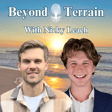
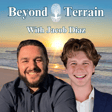
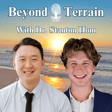
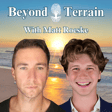

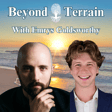
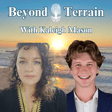
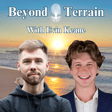



![DNA Doesn't Exist & Genomic Nonsense with Dr. Jerneja Tomsic [Part 2] image](https://media.zencastr.com/cdn-cgi/image/width=112,quality=85/image-files/652933f3a749dc383eb375de/ce5a5fd9-98c9-44fe-9b4b-3d0cd5abcf29.png)


